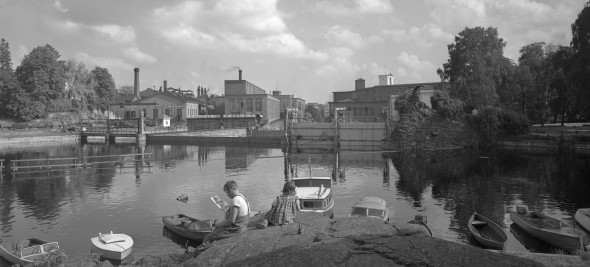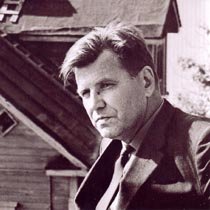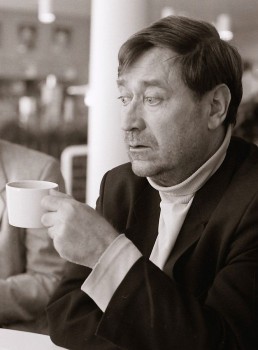New from the archive
26 March 2015 | This 'n' that
This week, a cluster of pieces from and about left-leaning Tampere, the ‘Red City’ of Finland

The Tampella and Finlayson factories, 1954, Tampere. Photo: Veikko Kanninen, Vapriikki Photo Archives / CC BY-SA 2.0.
Also known as the ‘Manchester of Finland’ for its 19th-century manufacturing tradition, Tampere – or rather the suburb of Pispala – produced two important, and strongly contrasting, writers, Lauri Viita (1916-1965) and Hannu Salama (born 1936). Both formed part of a group of working-class writers who emerged after the Second World War, many of whom had not completed their school careers and whose confidence arose from independent, auto-didactic, reading and study.
To understand the place from which these writers emerged, it has to be remembered that there is more to Tampere than a proud radical tradition. As Pekka Tarkka remembers in his essay, the Reds were the losing side in the Finnish civil war of 1918, and for years afterwards they formed ‘a sort of embattled camp in Finnish society’. History is always written by the winners, and authors like Viita and Salama played an important role in giving the Red side back its voice.

Lauri Viita.
Lauri Viita celebrated Tampere by offering an image of it that is, as Tarkka remarks, ‘poetic, deterministic and materialist’. His poetry differed sharply from the modernist verse of contemporaries such as Paavo Haavikko and Eeva-Liisa Manner, both of whom we have featured recently in our Archive pieces, which abandoned both fixed metres and end-rhymes. His work was an often heroic celebration of the ordinary life of proletarian Tampere, and the more traditional form into which it breathed new life made it accessible. My own mother, for example, who had grown up the child of a Red working-class family far away to the north, in Kajaani, steeped in the rolling cadences of poets such as Aaro Hellaakoski and Uuno Kailas, never really got the hang of Haavikko, or Manner; but she loved Viita.
Here we publish a selection of Viita’s poems, translated by Herbert Lomas, who does an excellent job of capturing his easy-going, unselfconscious rhythms. The introduction is by Kai Laitinen.

Hannu Salama.
Photo: Ptoukkar / CC BY-SA 3.0
Salama is a far more politicised writer than Viita, and he is writing about a Tampere that is already in decline. In his major work, Siinä näkijä missä tekijä (‘No crime without a witness’, 1972), he writes about the travails of the communist minority, doomed to slow extinction – the same band of fellow-travellers to which my grandfather in Kajaani belonged. My mother wasn’t a Salama fan, though – I think his Tampere wasn’t beautiful, or heroic, enough. As someone who had moved far away, to England, she wanted to celebrate, not to mourn.
Here we publish a short story, Hautajaiset (‘The funeral’), which was written at the same time as Siinä näkijä missä tekijä. It’s an unvarnished account of a Tampere funeral which is, at the same time, the funeral of the old, radical way of life – which, sure enough, has vanished almost as if it never existed. As Pekka Tarkka writes of Salama’s short story and the revolutionary songs which run through it: ‘There will be no more singing of communist psalms, or fantasies of the family and of the revolutionary spirit.’
As Marx didn’t say, all that seemed so solid has melted, irretrievably, into air.
*
The digitisation of Books from Finland continues, with a total of 380 articles and book extracts made available online so far. Each week, we bring a newly digitised text to your attention.
No comments for this entry yet
